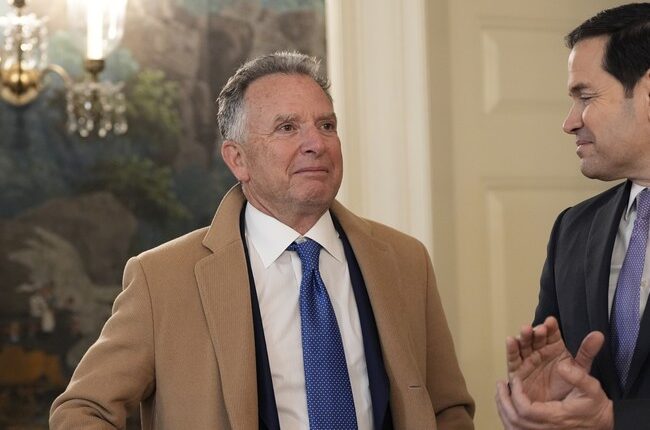
The clock is ticking, and we still don’t know if/when the remaining hostages held by Hamas will be returned. There are glimmers of hope, mixed with understandable doubts that this time, it will be different.
READ MORE: Israel, Hamas on the Verge of Ceasefire Deal, President Trump Announces; Netanyahu Reacts
12 Broken Ceasefires in 2014; Hadar Goldin’s Body Still Held After 11 Years; Peace with Hamas Unlikely
On the eve of the two-year anniversary of Hamas’ horrific attack on Israel, U.S. Secretary of State Marco Rubio sat down with Martha Raddatz on ABC News’ “This Week” to discuss the current state of play.
Rubio maintained a note of optimism, while acknowledging that nothing about this is easy and laying out some of the specifics regarding the phases of the plan.
“This is the closest we’ve come to getting all of the hostages released. Every single one.”
Secretary of State Marco Rubio expressed optimism that a deal between Hamas and Israel to end the war in Gaza could finally be reached.
Read more: pic.twitter.com/jFqk6psCMa
— This Week (@ThisWeekABC) October 5, 2025
RADDATZ: Let’s pick up where Ian left off. Are there real signs of hope here? Is this different?
RUBIO: This is the closest we’ve come to getting all of the hostages released. Every single one. All 48, including the 28 who are deceased. Of course, the 20 that are still alive. But, you know, there’s a lot of pitfalls along the way. There’s some work to be done here.
I would encourage everyone to think about this in two phases. Phase number one, which Hamas has accepted, is the president’s framework for release. The hostages are released and Israel pulls back to what’s been called the yellow line, roughly where they were in August of last year. And that exchange happens. And that’s the first phase of these talks, because you have to work through the logistics of that. You know, where do we — who’s going to come pick them up, what’s going to be the process for the exchange. We want to see that happen very quickly.
The second phase of this conversation, and they can be happening simultaneously, is, what happens after that? What happens after Israel pulls back to this line? What happens with this international group that’s going to come in and create a governance structure, an international governance structure, led by technocrats, Palestinian technocrats, et cetera? That’s the part that I think is going to be a little tougher to work through. But that’s what’s going to provide permanency to the end of the conflict.
So, we’re focused on those two phases. Phase number one, incredibly important, getting those 20 hostages — all 48 hostages back.
Rubio also emphasized that things need to move quickly, fleshing out a bit more as to what President Trump’s 72-hour deadline means.
Secretary of State Marco Rubio said negotiations to end the war in Gaza need to happen “very fast,” otherwise President Trump’s proposed deal “becomes imperiled.”
“So this has to happen quickly. For the sake of the hostages, the families and this deal.” pic.twitter.com/fgON95mvm8
— This Week (@ThisWeekABC) October 5, 2025
RADDATZ: And one of the things President Trump said is that the — “the hostages should be returned to Israel within 72 hours of acceptance of the plan.” Has that clock started, or do you not quite think they’ve accepted the plan?
RUBIO: Well, I think they’ve accepted the outlines and the principles of the plan. What hasn’t been worked out, as we just discussed, is, what is the logistics of it? You know, how is it going to work? Where — what time, where? You know, there are logistics involved here. You’ve got to send somebody into that area to go pick them up. We saw that previously in the other hostage releases where the Red Cross would go in, they would take custody of these people, they would bring them back out. All of that has to be worked out. And I think at that point is when I would say, if we want to get technical about this and legalistic is when the clock would begin to run.
The goal in saying 72 hours is he wants to see it happen quickly. This is not something that can drag out. We cannot be here three weeks from now still discussing, you know, the logistics of how hostages are going to be released. That has to happen very quickly in order for the rest of this deal to gain momentum.
We’re dealing with two sides here who absolutely despise each other. And, obviously, we understand, after October 7th two years ago, why it is that the Israelis have such little trust in Hamas. And no one should have any trust in Hamas. But we got to get this thing done. And — and I would say we want to see it done very quickly. And the hostage peace has to happen very, very fast.
RADDATZ: And you’re talking about within a couple of days? Should we expect it next week if it doesn’t (ph) happen this week?
RUBIO: Well, actually, the talks — yes, already some of the technical talk is happening right now. And our hope is that by the time our team gets to Cairo, 90 percent of this has been worked out and we’re just sort of finalizing the logistical piece. We’d like to see it done yesterday. I mean, we want to see the hostages moving as quickly as possible.
We understand that we have to get the teams like the Red Cross or whoever it is that’s going to be that goes in and gets, all these things have to be worked out. And that shouldn’t take that long.
All those talks are occurring even as I speak to you now. We’re hoping it will be finalized very quickly, early this week. And I’m hoping, you know, again, who knows the timeline. But this cannot take weeks or even multiple days. We want to see this happen very fast.
If it doesn’t, then I think the entire deal becomes imperiled. So this has to happen quickly, for the sake of the hostages, the families and this deal.
Raddatz questioned Rubio as to how things will look going forward, and the insistence that Hamas cannot be a player.
Secretary Rubio says those in favor of “enduring peace should be in favor of demobilization of Hamas.”
“As long as there’s a threat emanating from Gaza against Israel security, be it Hamas or some successor organization … there isn’t going to be peace.” pic.twitter.com/2D2u06afm0
— This Week (@ThisWeekABC) October 5, 2025
RADDATZ: And, Secretary Rubio, President Trump also said that Hamas cannot pose a threat again. They have not talked about part of this deal, which is disarming.
RUBIO: Yeah. Look, that’s going to be a key component of that second phase we just discussed. As long as — as long as there’s a threat emanating from Gaza against Israel security, be it Hamas or some successor organization, as long as there are people, organizations inside of Gaza who possess rockets, build tunnels, want to kidnap, murder and rape Israeli citizens and attack Israel, there isn’t going to be peace. Everyone knows this, including the Arab countries in the region, which is why they all signed on to this deal put forward by President Trump, that deals with the fact that what Israel wants, what we want with the deal envisions with the countries in the region envision is a Gaza that’s run by Palestinian technocrats and Palestinian civil servants and Palestinian leaders that do not pose a threat to Israel.
If there is a threat emanating from Gaza, you’re not going to have peace here that’s sustainable. So that has to happen, that demobilization has to happen.
And clearly, Hamas is an organization that we do not believe can be a part of that because of their history, their very purpose for existence is to threaten the Israeli state. So that’ll have to be addressed in the second phase. And it’s going to be a tough piece of it, no doubt about it.
But if we truly want enduring peace, anyone who is in favor of enduring peace should be in favor of demobilization of Hamas or any other armed terrorist organization that seeks to operate from Gaza.
RADDATZ: And President Trump’s ally, Senator Lindsey Graham, was critical of Hamas’s response. He said it was a classic, “yes, but.”
What would you say to the senator?
RUBIO: Well, I would say we all have to be clear-eyed about this, right? There are conditions that have to be met here. If two weeks from now or a week from now, whatever, it’s clear that the hostages aren’t going to be released and they’re playing games, then I think the president stated what our position is going to be. He did so in a Truth Social post on Friday morning, giving them a 6:00 p.m. deadline of Sunday to accept.
And I thought that it was telling that within hours of that, we get this letter from Hamas basically saying we agree to the framework the president’s put forward. Let’s have our mediators negotiate the logistics for the release of the hostages, and we need to enter into further talks about the rest of the deal.
So, no one here is claiming this is done. What we are claiming is that we have moved a — so we are in a much better place today than we were seven days ago. A lot could have happened wrong here, but so much could happen, right if we can get this done and we’re very dedicated to making that happen.
And look, it’s not just the United States, although this is an initiative that President Trump deserves a tremendous amount of credit for. But it’s Qatar, it’s the UAE, it’s Israel who’s been involved in these talks. It’s Saudi Arabia. It’s Indonesia. It’s countries like Egypt and Jordan and other countries from the region — all of whom are pushing hard and are behind this effort.
We all want to see it get done. And I think that collective pressure can make this happen. I’m optimistic it will happen, but it won’t be easy.
Rubio and the Trump administration do appear to be clear-eyed on this, as he notes is necessary. The takeaway here seems to be that no one should be holding their breath…but if this is ever going to get done, now is the time.
Editor’s Note: The Schumer Shutdown is here. Rather than put the American people first, Chuck Schumer and the radical Democrats forced a government shutdown for healthcare for illegals. They own this.
Help us continue to report the truth about the Schumer Shutdown. Use promo code POTUS47 to get 74% off your VIP membership.









